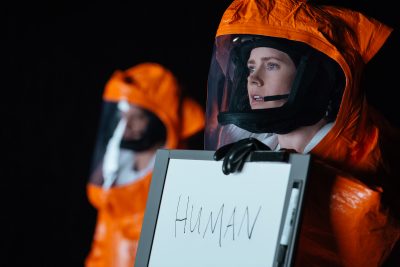
“Arrival,” released Friday, is based off the Ted Chiang short story and tells the story of linguist Dr. Louise Banks (Amy Adams) as she is chosen to attempt to communicate with two alien beings in their oval-shaped ship, along with 11 others scattered across the globe.
Along with physicist Ian Donnelly (Jeremy Renner), the two must translate the aliens’ communication to understand their purpose before it is too late.
This all sounds like a typical blockbuster we’ve all seen for decades: two big celebrities have to fight off extra-terrestrials in order to save the world. However, “Arrival” is not about the end of the world or an all-out war with other beings, as seen in movies like “Independence Day.”
Instead, it stands in an extremely small class of alien movies along with “Contact” and “2001: A Space Odyssey” that are sophisticated, beautiful and acutely human.
“Arrival” it is a testament to the skillful storytelling abilities of Quebecois director Denis Villeneuve. Many regard him as a master of tension, seen in movies like “Sicario” and “Prisoners,” and “Arrival” is no different. Villeneuve captures a seemingly accurate portrayal of what real first contact would be like. There is a great sense of tension that is often accompanied by wonder, fear and overall ignorance.
What makes this alien movie stand out among the rest is its simplicity and the brilliance and class that come along with that. The movie mainly takes place between a secluded military compound surrounding the ship and within the ship itself.
Although many political and social pressures that come along with first contact are present in the film, they all take a backseat to the main story of Adams and Renner trying to communicate with Abbot and Costello (the names that Renner’s character gave to the aliens).
Villeneuve could have easily made the movie about the social and political aspects of alien contact (as so many have) but in this movie, what we get is much more refreshing. We get to see the entire process of Adams and Renner trying to decode an alien language and establish trust with another intelligent species, and it is beautiful.
Each time the characters communicate with the aliens, the scene takes its time. This allows the audience to fully partake in each teaching session. After each session, instead of showing us all the political turmoil going on, it remains in the background and we sit in with Adams and Renner as they try to find out more information about the aliens.
One of the most compelling aspects of the movie is that it treats the audience as intelligent. Villeneuve does not feed us information. Instead, he lets us discover it ourselves. We act as scientists along with Adams and Renner, uncovering information with them as they discuss scientific and linguistic theories.
Like many sci-fi films, there is a sense of some big idea about the world building throughout the movie. Often times, this idea is either anticlimactic, trying too hard or just plain stupid.
However, in “Arrival,” instead of some big idea revealed at the end of the film, it is part of the structure of the film itself. The message of this story is too beautiful and important to give away in this review. It is a sentiment of unification, understanding and humanity — something that is greatly needed and refreshing in times like this.
This movie is almost an anti-blockbuster film. Methodical and introspective, “Arrival” is not for everyone. It is very smart, and that will turn off many viewers because they will have to work to understand what the film is trying to say, but that makes it all the more valuable. This movie will cause you to examine how you think about the world and will likely change it for the better. “Arrival” is a brilliant and beautiful sci-fi story that will captivate the intelligences of people for years to come.














